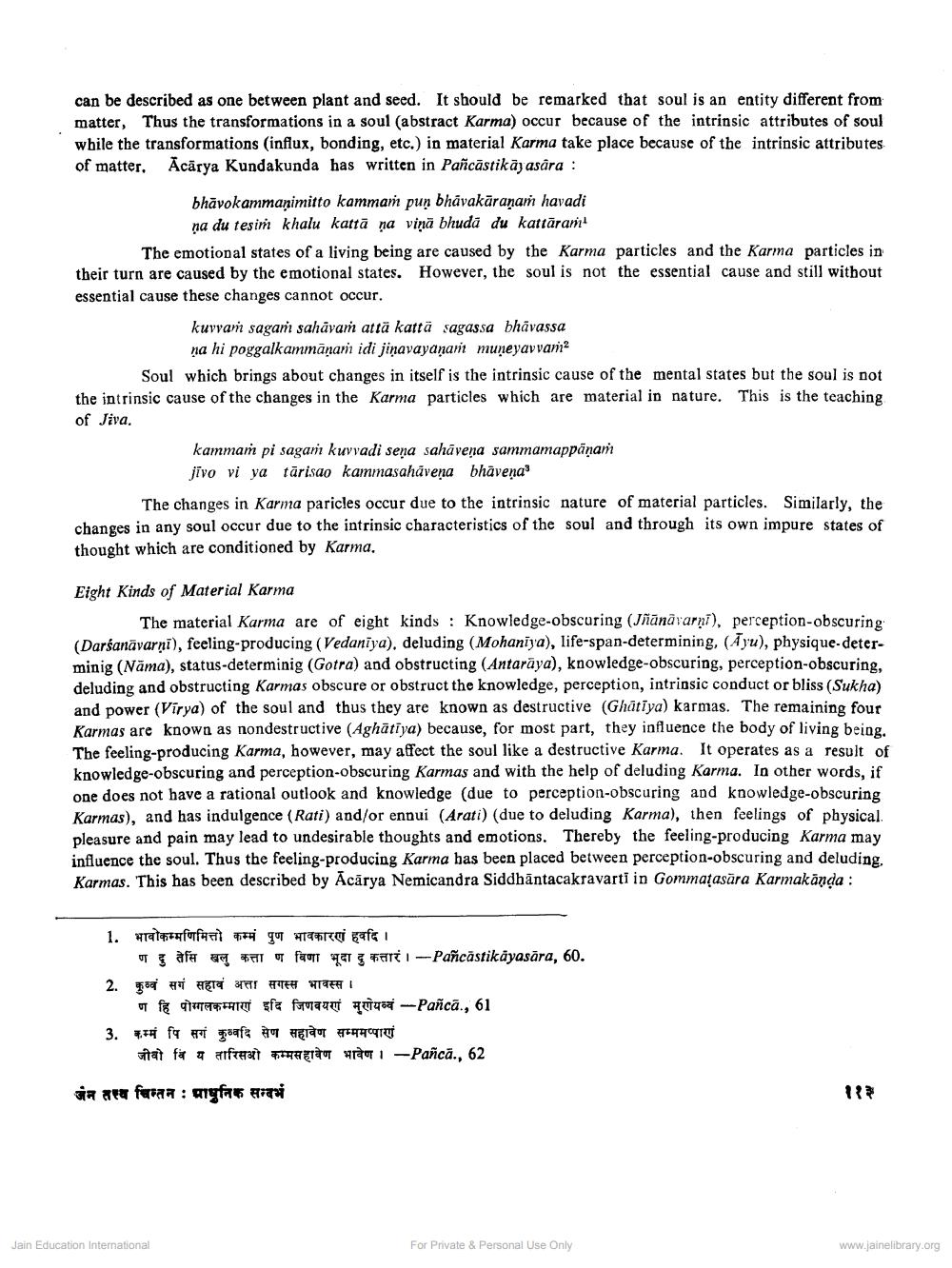Book Title: How Karma theory relates to Modern Science Author(s): Dulichand Jain Publisher: Z_Deshbhushanji_Maharaj_Abhinandan_Granth_012045.pdf View full book textPage 2
________________ can be described as one between plant and seed. It should be remarked that soul is an entity different from matter, Thus the transformations in a soul (abstract Karma) occur because of the intrinsic attributes of soul while the transformations (influx, bonding, etc.) in material Karma take place because of the intrinsic attributes of matter. Acārya Kundakunda has written in Pañcāstikājasära : bhāvokammanimitto kammam pun bhāvakāraṇaḥ havadi na du tesir khalu kattā ņa viņa bhuda du kattāran The emotional states of a living being are caused by the Karma particles and the Karma particles in their turn are caused by the emotional states. However, the soul is not the essential cause and still without essential cause these changes cannot occur. kuvvam sagar sahāvam attā kattä sagassa bhāvassa na hi poggalkammāņam idi jinavayanam muneyavvana Soul which brings about changes in itself is the intrinsic cause of the mental states but the soul is not the intrinsic cause of the changes in the Karma particles which are material in nature. This is the teaching of Jiva. kammam pi sagani kuvvadi sena sahāveņa sammamappānam jivo vi ya tārisao kammasahāveņa bhāveņa The changes in Karma paricles occur due to the intrinsic nature of material particles. Similarly, the changes in any soul occur due to the intrinsic characteristics of the soul and through its own impure states of thought which are conditioned by Karma, Eight Kinds of Material Karma The material Karma are of eight kinds : Knowledge-obscuring (Jñānāvarni), perception-obscuring (Darśanavarni), feeling-producing (Vedaniya). deluding (Mohanīya), life-span-determining. (Āyu), physique determinig (Nāma), status-determinig (Gotra) and obstructing (Antarāya), knowledge-obscuring, perception-obscuring, deluding and obstructing Karmas obscure or obstruct the knowledge, perception, intrinsic conduct or bliss (Sukha) and power (Virya) of the soul and thus they are known as destructive (Ghātiya) karmas. The remaining four Karmas are known as nondestructive (Aghātiya) because, for most part, they influence the body of living being. The feeling-producing Karma, however, may affect the soul like a destructive Karma. It operates as a result of knowledge-obscuring and perception-obscuring Karmas and with the help of deluding Karma. In other words, if one does not have a rational outlook and knowledge (due to perception-obscuring and knowledge-obscuring Karmas), and has indulgence (Rati) and/or ennui (Arati) (due to deluding Karma), then feelings of physical. pleasure and pain may lead to undesirable thoughts and emotions. Thereby the feeling-producing Karma may influence the soul. Thus the feeling-producing Karma has been placed between perception-obscuring and deluding, Karmas. This has been described by Ācārya Nemicandra Siddhāntacakravarti in Gommațasāra Karmakānda : 1. भावोकम्मणिमित्तो कम्मं पुण भावकारणं हवदि । ut afar u furor yang FETE I - Pañcāstikāyasāra, 60. 2. Fou Ta B rew wrathi of EFAT fa forwaun 145-Pañcā., 61 3. कम पि सगं कुव्वदि सेण सहावेण सम्ममप्पाणं at for a fra ** H OT HET 1 - Pañcā., 62 जन तस्व चिन्तन : माधुनिक सन्दर्भ 13 Jain Education International For Private & Personal Use Only www.jainelibrary.orgPage Navigation
1 2 3 4 5 6 7 8 9 10 11
